Table of Contents
Is Biosteel hydration and Biosteel protein powder safe for kids? These sports nutrition supplements are gaining popularity among youth and teens. As a dietitian and mom of a teenager, I share everything you need to know in this post.
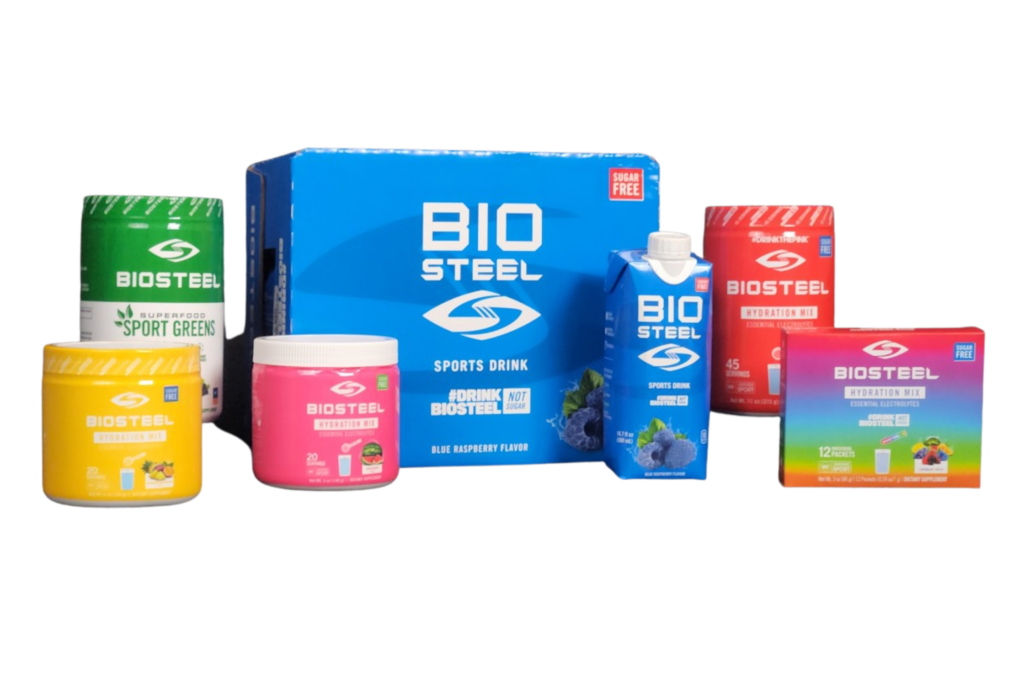
Sport hydration and protein supplements are exploding in popularity
Sport hydration and protein supplements have taken the wellness world by storm! But here’s the twist: it’s not just the pros diving in. Kids and teens are riding this wave too, whether they’re playing sports or not. Because “it’s cool”, right? The popularity surge of sport nutrition supplements among kids and young teens is nothing short of overwhelming. As a registered dietitian and mom to three kids, I whole heartedly empathize with the confusion surrounding these supplements!
In fact, supplement brands (such as Biosteel, Gatorade, and Prime Hydration) often partner with celebrity athletes to help market their products to the general population (including our kids!). Biosteel protein powder and hydration drinks are particularly popular due to their affiliation with world-renowned athletes such as NHL player Connor McDavid, and NFL player Patrick Mahomes.
The question is, are Biosteel products even safe for children and teens? In this post I will answer all your questions around Biosteel hydration and protein supplements, their safety, and whether or not your kids will benefit from them.
Here is what is covered in this comprehensive post:
- What is Biosteel hydration drink/mix?
- Safety concerns with Biosteel hydration supplements
- When is Biosteel hydration drink appropriate for kids?
- What are Biosteel protein powder supplements?
- Why is protein important for kids?
- Kids should be getting protein from food first
- Safety and quality concerns with protein powder
- Should my child be consuming protein powder?
- Is protein powder appropriate for a child who is underweight?
- What are the risks or safety concerns of consuming too much protein?
- What to avoid when choosing a protein powder for kids
- Alternatives to using protein powder

The importance of hydration for children and teens
We know that hydration is essential for multiple bodily functions whether your child plays sports or not. When it comes to sports performance, staying hydrated can make or break your game-to-game progress. From maintaining fluid balance, and muscle function, to making activity exertion actually feel easier, it can be said with confidence that hydration is not over-rated.
What is Biosteel hydration drink?
Biosteel hydration products were “originally made for professional athletes” but are now available to the general public to provide “great tasting hydration for your active lifestyle”. It’s true, during intense prolonged activity, the body will rehydrate better by replacing electrolytes lost through sweat (cue the sports drinks). However, if you exercise for less than an hour, or participate in activity with less exertion (such as walking or yoga), then all you need to replenish is plain water. Not so sexy, I know.
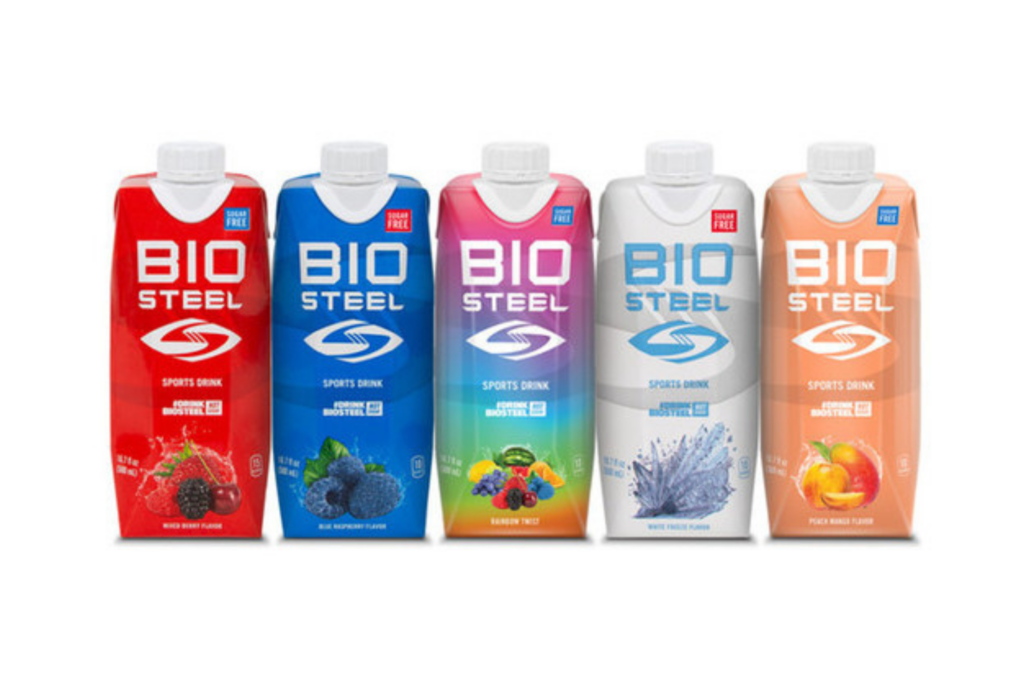
Biosteel offers two different hydration supplements; the sports hydration drink (which is ready-made) and the sport hydration powdered mix. These hydration supplements are similar, but have some distinct differences:
| Biosteel Sport Hydration Drink Ingredients | Biosteel Hydration Mix (Powder) Ingredients |
| 10 calories Electrolytes (230mg sodium, 225mg potassium, 25mg magnesium, 50mg calcium) Stevia extract sweetener |
5 calories Electrolytes (140mg sodium, 33mg potassium, 2 mg magnesium, 12mg calcium) Stevia extract sweetener Amino acid blend B vitamin blend Beetroot 0.2mg Zinc 135mg Taurine |
Safety concerns with Biosteel hydration drinks for kids:
Drinking a simple sport drink shouldn’t be cause for concern, right? To have a true understanding of any supplement, we have to know what’s in it. Here’s a deeper look at the ingredients found in Biosteel hydration drinks:
- Electrolytes: Potassium, sodium, magnesium, calcium, are all important in regulating muscle function and contraction as well as fluid balance in the body.
- Stevia extract: a non-caloric sweetener extracted from stevia leaf. It is generally recognized as safe by the FDA. However, more research is needed for long-term effects of all non-caloric sweeteners, on hormonal and metabolic response and the impact on sweet cravings in children.
- Amino acids: tiny building blocks derived from protein, that are essential for muscle recovery, preventing muscle breakdown, and help improve sport performance.
- B vitamins: important for energy production and metabolism, as well as supporting healthy blood cells and circulation.
- Beetroot powder: contains nitrate which has been shown to improve aerobic exercise performance in certain adult populations.
- Zinc: an essential mineral which strengthens immune function and cell growth and division.
- Taurine: A type of amino acid involved in the fluid balance of cells and helps support muscle contractions. There is mixed research on whether its supplementation improves recovery from exercise, thereby enhancing sport performance.
Both hydration supplements contain stevia, a no-calorie sweetener extracted from stevia leaf. Drinking sweet beverages that provide little energy or nutrition, can displace more nutrient-dense foods from the diet. This can be especially concerning for children who are growing and need enough calories and nutrients to support proper growth and development.
The hydration mix contains added amino acids (small building blocks in protein), zinc and b vitamins in small amounts. The tiny amounts of these ingredients present in the Biosteel hydration mix does not pose adverse health risk to older children or teens.
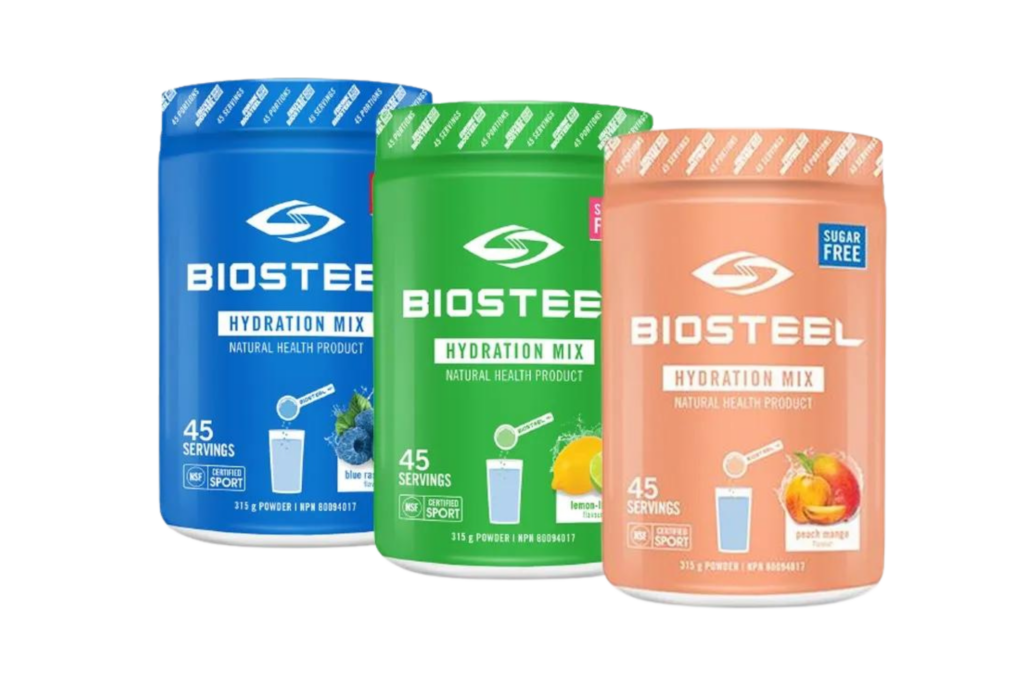
There is little research however, on how taurine (a special amino acid, often found in energy drinks) and beetroot powder (present in the hydration mix) affects children and youth. For adults, some research points towards performance enhancing qualities of these ingredients. However. For children, the potential risks or side effects of these ingredients are not yet fully understood, especially when it comes to the rapidly growing bodies of children and young teenagers, putting them in a “better avoid, to be safe” category.
When is Biosteel hydration drink appropriate to give to my child?
A sport hydration drink may be beneficial if you have a child involved in higher level sport. For example, if your child participates in extended periods (over 1 hour) of back-to-back high intensity activity, a hydration drink may be needed to help them maintain energy level, concentration and prevent injury. These drinks may also be helpful if your child is exercising in a hot environment and sweating more than usual.
Biosteel hydration mix: To stay on the safe side, I do not recommend the Biosteel hydration mix for kids due to the added ingredients that haven’t been sufficiently studied for their benefits or side effects in children.
Biosteel Sport Hydration Drinks: The ready-made Biosteel hydration drinks do their job to replace electrolytes, but fall short in replacing carbohydrate. A hydration drink that also contains added carbohydrate (sugars) will provide energy and replenish glycogen stores in your child’s working muscles. This helps to both improve performance and prevent early burnout! Now don’t panic if your child (whether or not they are an elite athlete) has consumed these drinks–it won’t negatively impact their health and is likely totally fine in small amounts, once in a while. But again, a carbohydrate-containing sport beverage is recommended for hydration during intense sport, and water is best otherwise.
But remember, for everyday life, water is always the best primary source of hydration for children!
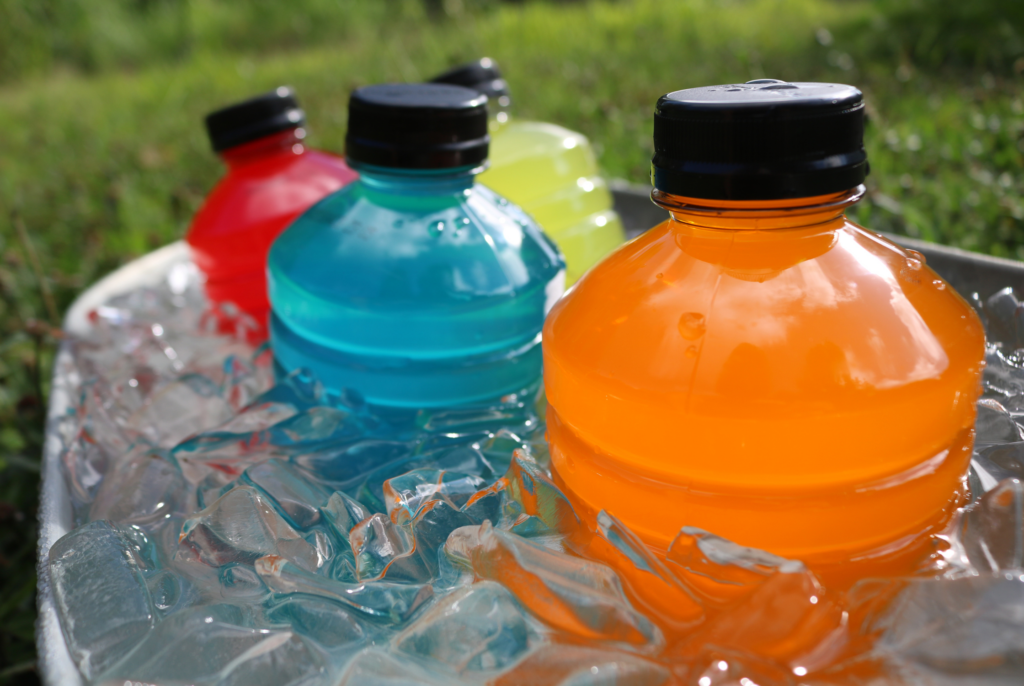
Do we really need to buy the expensive sport hydration drinks for our kids? No. Are they convenient? Yes. The decision is 100% up to you and what feels right for your family.
Here is a customizable homemade hydration drink to give a try in the meantime:
- 1 cup of 100% fruit juice*
- 1 cup of coconut water
- 2 cups of water
- 1/8 tsp. of salt
*Customize the flavor by choosing different fruit juice options (for example orange juice, mango juice, or pineapple juice!)
Hydration drinks are not the only supplement popular among children and teens. Protein powder supplements and protein shakes have also joined in the top ranks of sport nutrition supplements used by kids! Of course, Biosteel has an impressive range of different protein powder supplements and flavors to choose from. Let’s dive into that, shall we?
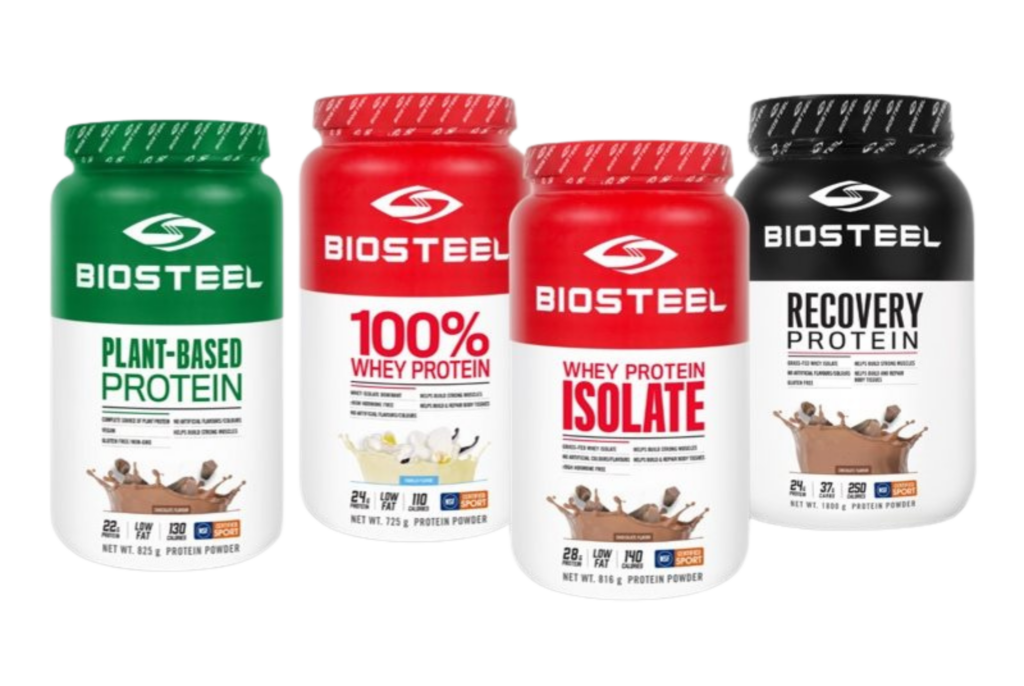
Biosteel Protein for Kids
On their website Biosteel claims that their protein powders “are specially formulated to help your body build, restore, and maintain strength, the healthy way.” Why wouldn’t you want your kid to have access to a supplement that can do all that?!
There are actually quite a few factors to consider before hopping on the protein powder train. What’s in the fomulation? Is it safe? When is it appropriate to serve my child protein powder? As a concerned parent myself, these are all important questions that deserve answers. Not to worry, I’ve done the research, and have got you covered!
What is Biosteel protein powder?
Biosteel protein powder has become particularly popular due to its partnership with world-renowned athletes like NHL player Connor McDavid, and NFL player Patrick Mahomes. Its safe to say this brand has definite buy-in with hockey and football fans across North America.
Let’s take a look at the different types of protein powder supplements Biosteel markets to the general population:
- Whey protein isolate: Whey is a type of protein found in milk that is quickly digested and easily absorbed. It is isolated from the carbohydrate and fat components of milk, then dried and powdered. It can then be used to make post-work out protein shakes an ideal option for muscle recovery.
- Plant-based protein: Biosteel plant-based protein combines brown rice, pea, and pumpkin seed proteins to provide a complete protein source. This is a good protein supplement for plant-based athletes who do not consume dairy or animal products.
- Recovery protein: Designed to help the body optimally recover after an intense bout of exercise. This protein powder contains isolated milk-based proteins (whey and casein) as well as added carbohydrate. This protein supplement targets both muscle repair as well as replenishing glycogen stores (a form of energy storage in liver and muscle cells) which becomes depleted during intense activity.
All Biosteel protein supplements contain stevia leaf extract as a non-caloric sweetener.
Why is protein important for kids?
It is essential for kids to get protein in their diet everyday. Protein quite literally provides the building blocks they need to grow and develop. From building and repairing muscles, organs, skin, hair and nails, to supporting hormone production and immune system function!
What you might be surprised to learn is that parents often overestimate their child’s daily protein requirements. Protein actually adds up quite quickly from a variety of different foods. We usually think of protein coming from foods like dairy, eggs, meat, fish, legumes, nuts, and seeds. However, protein also adds up in small amounts from the whole grains, fruits and vegetables we eat!

Kids should be getting protein from food first:
There is this common fear that kids aren’t eating enough protein in the day, which can translate into a daily mealtime struggle for many parents (especially when kiddos are going through a “picky eating” phase).
I am here to tell you that you are doing a great job, and your child is more than likely getting the protein they need. It is normal and OK for your child to eat less one day, then make up for it later on in the week.
You can rest easy knowing that most kids will get more than enough protein to support healthy growth and development from food sources alone.
Here are some tangible examples of how your child can meet their minimum protein requirements from food:
| Age | Protein requirements (minimum) | What does that look like in food? (Note: Your child will likely consume more food in one day than what is outlined here) |
| 4-8 years old | 19g | 1 cup of milk 1 egg 1 tbsp. peanut butter |
| 9-13 years old | 34g | ½ cup cooked oatmeal ½ cup Greek yogurt 2 slices of whole grain toast 2 oz turkey breast cold cuts 2 tbsp. hummus ½ cup sugar snap peas |
| 14-18 years old(male) | 52g | Smoothie: 1 cup of milk ½ cup of silken tofu 1 banana 1 tbsp. peanut butter 1 cup vegetarian chilli 1 whole grain dinner roll 1 Lara bar |
| 14-18 years old(female) | 46g | 1 cup of milk ¼ cup almonds 1 cup of cheerios 1 cup of cooked pasta ½ cup of homemade meat sauce ½ cup of peas 1 apple |
Safety and quality concerns with protein powder for kids
As parents, we want to be certain that anything we feed our children is considered safe. The truth is, not all protein powders (or any nutrition supplement for that matter) are created equal. So, what should you look for to determine if a product is safe?
All natural health products (including protein powders) must be licenced by Health Canada to be sold on the shelf. The product is then assigned a “Natural Health Product Number” (NPN#) on the label if it has been found to be effective and of high quality “under recommended conditions of use”. Most protein powders, including Biosteel protein, have been designed to help adult athletes recover from training. Therefore, a full scoop of protein powder is likely too much protein for children or young teenagers.
I also recommend that you look to see if your protein powder has been third party tested by an independent certification company such as NSF and Informed Choice . These programs validate accuracy of ingredients and nutritional content, while screening for banned substances and contaminants like heavy metals, toxic chemicals and pathogenic bacteria. Look for the informed choice check mark or NSF logo on your protein powder to confirm if it is third party regulated.
Good news! All Biosteel products are certified and regularly tested by the NSF public health and safety organization.
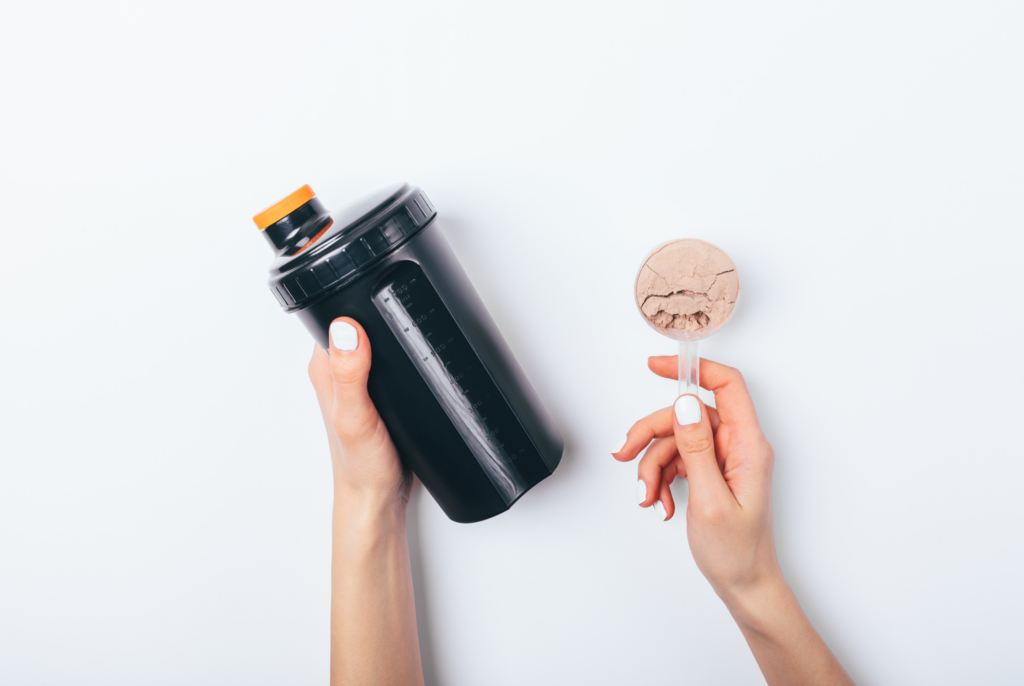
Should my child be consuming protein powder?
As mentioned above, protein powders are often designed to help adult bodies recover after training or working out. In fact, one scoop of Biosteel whey protein isolate contains a whopping 28g of protein per scoop, with the recovery protein powder coming in at 24g per scoop. If your child is less than 8 years old, this exceeds their daily protein requirements… while one scoop covers 50-80% of protein requirements for older children between the age of 9-18 years old.
Even still, there is no straight forward yes or no when it comes to discerning whether your child should be consuming protein powder. It comes down to a couple factors:
1. Do you have a child involved in high level sport that needs to recover quickly between extended periods of high intensity activity?
Whey protein isolate or the Biosteel recovery protein could be a good option for your teenager. However, depending on your teen’s size, you may need to mix ½ a scoop (or less) of protein powder into their recovery shake. This is where the individualized advice of a registered sport dietitian will come in handy!
2. Consider the age of your child and protein requirements.
Can kids younger than 8 years old, consume protein powder? Sure, they can. But they may only need around ¼ of a scoop in their protein shake. Offering your child 1 cup of chocolate milk will actually provide a similar amount of protein, with the added benefit of sugar to help replenish their energy stores after activity.
Is protein powder appropriate for a child who is underweight?
First, it is important to address the underlying cause of why your child may be considered “underweight”. There are many things to consider before supplementing your child with protein powder. If your child won’t or is unable to eat enough food, protein powder can be used in specific dosages to help them reach their daily requirements. Always consult your pediatrician to determine if there is an underlying illness or concern. Be sure to coordinate with a dietitian who can help you identify any feeding concerns, and if appropriate, show you how to incorporate protein powder into your child’s eating routine.
What are the risks or side effects of too much protein?
Eating too much protein, especially from protein powder, can cause your child to experience unpleasant stomach issues, such as cramping, bloating, constipation and gas. Excessive protein can also place additional strain on your child’s developing kidneys. For kids with healthy kidney function this might not be a big concern, however too much protein can be problematic for kids who have underlying kidney issues.
Keep in mind that protein can quickly add up when using protein powder supplements, especially for smaller bodies. Consuming too much protein may displace other important essential nutrients that children need to support proper growth and development.
Is there anything I should avoid when choosing a protein powder for kids?
Like mentioned above, avoid buying protein powders that are not approved by Health Canada (they will not have an NPN# on the label) and that aren’t third party tested for safety and quality of ingredients.
Some protein powders contain powdered greens, herbal extracts, or excessive levels of added vitamins and minerals. Children have lower nutrient requirements than adults, so its important to check the label that these ingredients are not listed. Often one serving may exceed their requirements, or even cross over into toxicity territory. Yikes!
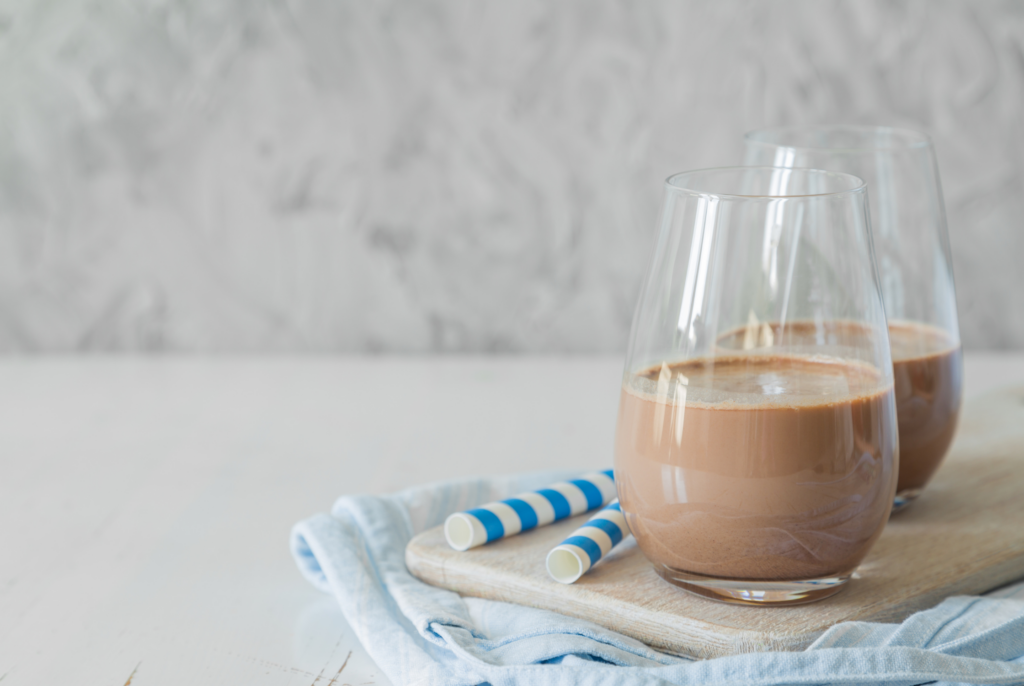
Alternatives to using protein powder
Just played a rigorous game of soccer? Sweated out their gear in hockey practice? The goal is to offer your child a quickly digestible source of protein and carbohydrate, preferably in a liquid form that they can drink. This is especially helpful if they have a short period of time to recover before starting up another bout of intense activity. Here are some examples of homemade protein shakes that you can make without needing to buy protein powder:
- Chocolate milk: 1-2 cups of chocolate milk
- Skim milk powder: Bring skim milk protein powder in a baggy and simply shake up with water in a shaker cup. This is a great shelf stable option.
- Smoothies: Blend fruit, with milk or juice and a source of protein (Greek yogurt, soft tofu, nut/seed butter, hemp hearts etc.)
Bottom line
Sport supplements like Biosteel hydration and Biosteel protein once targeted mainly at elite athletes, are now being marketed to children and teens as well.
So, what’s the take-away here? To stay on the safe side, I do not recommend the Biosteel hydration mix (powder) for kids due to the added ingredients that haven’t been sufficiently studied for their benefits or side effects in children. On the other hand, the ready-made Biosteel sport hydration drink is a viable option to offer your child in certain circumstances, such as high intensity exercise. As boring as it may sound, plain old water is your best rehydration option for lower intensity exercise.
When it comes to Biosteel protein powders, I recommend parents prioritize protein sources from food for their kiddos, and only consider protein powder supplementation under specific circumstances, such as high-intensity sports and after consulting healthcare professionals. I truly hope this post helps you navigate this hot topic! Remember, my team of dietitians are always here to help guide you along the way.
References:
- BioSteel: Sports Hydration & Nutrition Products for Athletes – BioSteel – Canada
- All About Sports Drinks (pennutrition.com)
- ISSN exercise & sports nutrition review update: research & recommendations – PMC (nih.gov)
- Artificial sweetener use among children: epidemiology, recommendations, metabolic outcomes, and future directions – PMC (nih.gov)
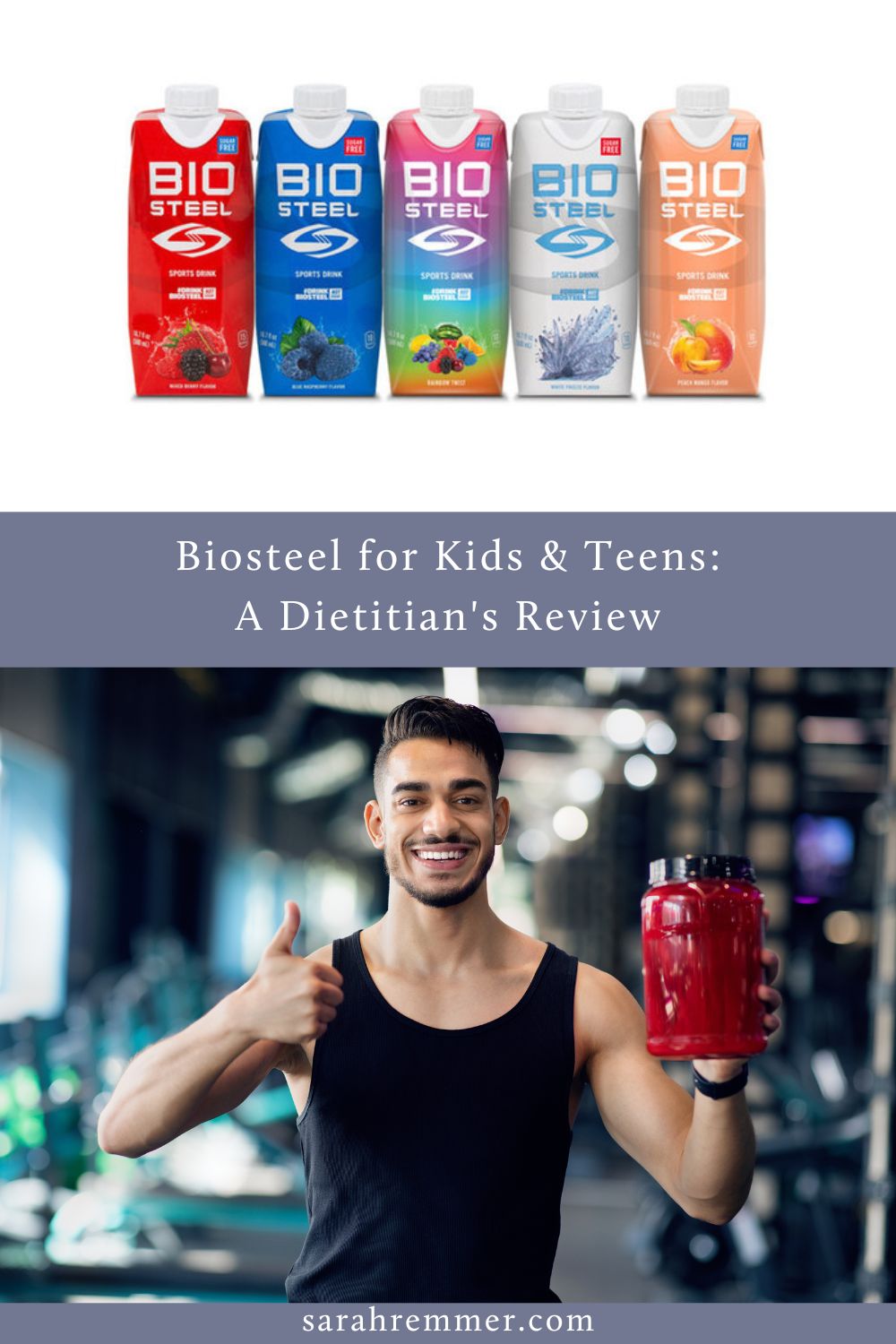

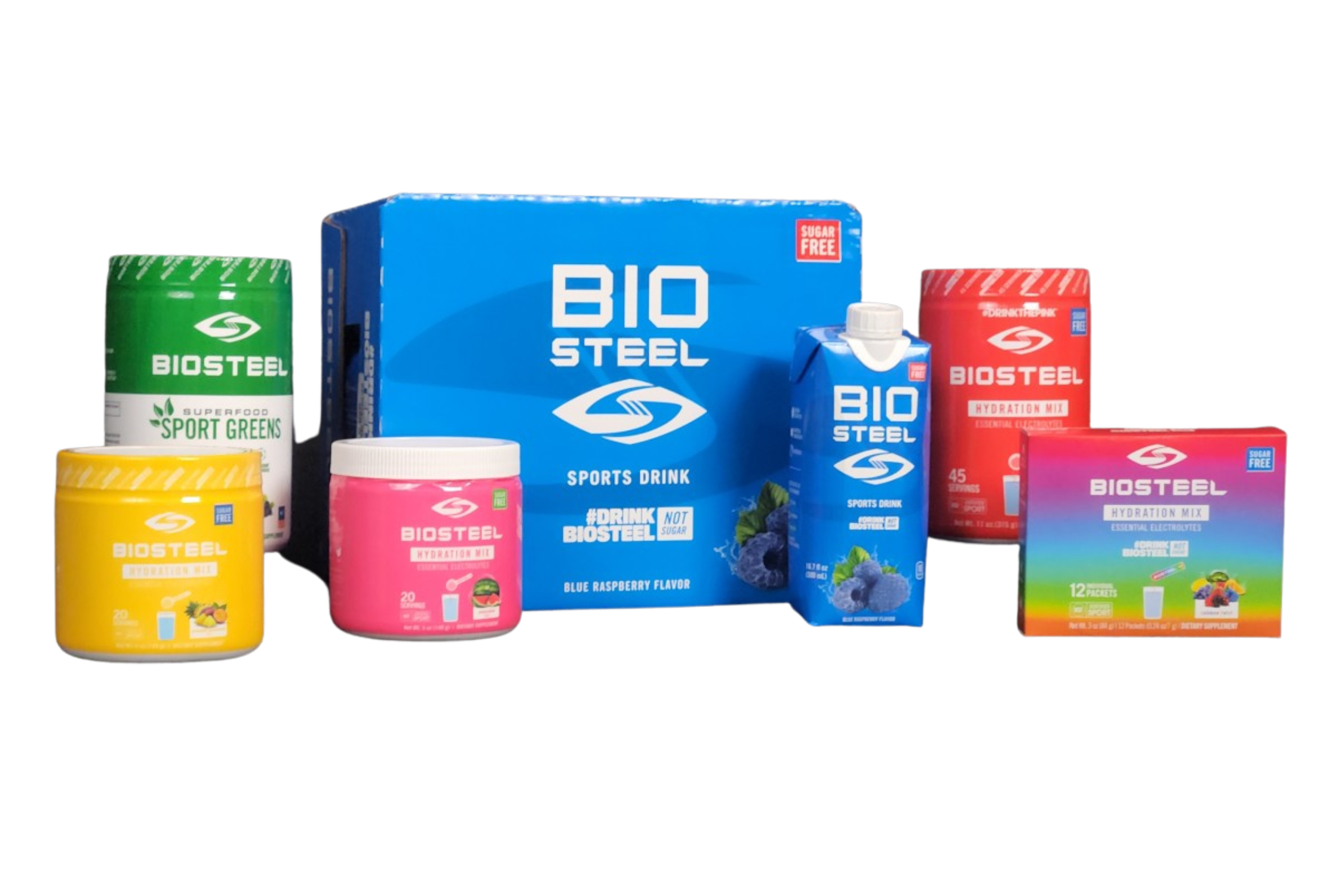



More Stories
Avocado Cacao Mousse – JSHealth
Janelle Brown on Garrison’s Mental Health Before His Death
How To Finally Beat Insomnia